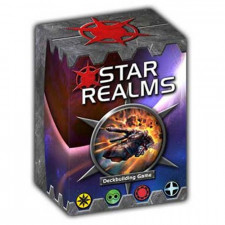Star Realms Deckbuilding Game Review
on Mar 20, 2015
Perhaps more effectively than any other mechanism in vogue today, deckbuilding can provide a real sense of pace, timing, and progression to a game. Games kick off slowly, with a small card purchase here and a tiny attack there, but in what feels like just a few turns players seem invincible, slapping cash down to buy every card on the table and blasting their opponents away with glee as they cackle like madmen. It’s easy to see why it’s such a popular genre at the moment, as the games satisfy every player’s lust for leveling up and dynamic growth within a session. It’s just oh-so-gratifying to tackle that big monster, or make that expensive purchase that seemed impossible just a few minutes before. Of course, because of the simplicity and adaptability of the idea, publishers and designers the world over have brought their spin on the game to market.
With the gaming landscape seemingly buried in deckbuilders then, it seems at first blush that there wouldn’t be room for Star Realms, a light, pared down version of the system that really brings no new ideas to the table. If you’ve already got Dominion, Ascension, Thunderstone, or one of the other countless similar fare out there, you’re bound to ask yourself, “What does this little guy offer that I don’t already have?†Consisting of a hundred cards or so, some neat if forgettable sci-fi art, and several in-game factions to purchase, it just doesn’t feel as if there’s enough here to really give Star Realms a second look.
If you’ve played a deckbuilder, you basically already know how to play Star Realms. You draw a hand, purchase whatever you can and then use the attack “currency†to knock down your opponent’s health, reshuffle, lather, rinse, repeat. There is a confrontation element where you’re blasting away each other’s bases and authority points, an element that should please those who have decried the genre as multiplayer solitaire, although essentially it’s no different than scoring VP in other games. It’s not too terrible that the game doesn’t have some crazy gimmick to set it apart from everything else, but there’s something else that bothers me a bit about how the game plays out.
See, the neat thing about deckbuilders is they give players choices in how their little-deck-that-could is going to progress to the endgame. They’re also hugely replayable, as players kick themselves for making a stupid purchase early on, or for passing on a strong card that their opponents then snapped up and used to kick their faces in. These great big moments just sort of explode out of the decisions the players made earlier in the game, as gamers’ plans smash into one another in a giant deckbuilding trainwreck. When it works, it’s delightful.
Star Realms does provide these big moments, but they feel inevitable. On a given turn, you may be able to purchase two or three of the cards in the buying row, and the choice isn’t always obvious. But by the end of the game, it’s clear that the decision may have bought you an extra turn, given you an extra point of damage, or a slight advantage in purchasing--but it wouldn’t have flipped the outcome of the game on its head. Everyone is kind of automatically snowballing toward the explosion at the end of the game, and players are just along for the ride.
It is a fun ride though. There is something enjoyable about coupling together 25 points of damage and slapping your opponent around a bit, or finally getting a big turn after many hands of nothing but junk. The heavy luck element in the purchasing row and the card draw, plus the mostly mindless card play will turn off players looking for something more strategic. But for those of us who are okay with some chance in our gaming, it won’t offend too much. Just don’t expect the turns to play out like a juicy Mage Knight decision tree or anything.
Luckily, the game’s position in the market poises it nicely to rise above the sum of its parts. A complete deckbuilder that usually sells for less than $20, slips into a bag or backpack, and plays in under 30 minutes consistently is a rarity indeed. The barrage of expansions the designers have fired off allow for some interesting twists, like powerful one-off abilities, chaotic events to knock everyone down a peg, and even some neat solo modes. So in spite of the game’s autopilot play style, I think it really is a good purchase as a time-killer or introduction to the deckbuilding genre.

 Customer Support
Customer Support  Subscribe
Subscribe 




 Account
Account  Wishlist
Wishlist 

